|
|
|














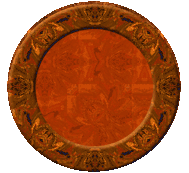
Egypt |
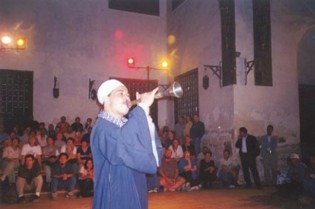
The music departs its initial trance and quickly breaks into a melodious and joyful
romp through villages. Smiles appear as the lights rise up to welcome us to
their world, the drums' intensity increases and the flutes become playful. A call
and answer round ensues as one by one each musician takes center stage for a
solo showing off his superb skill. |
The music turns tempo, we all strain for what is next as the robed figures of 5 men
circle into the room with tambourines, stepping lively throughout the space
while keeping a perfect and steady rhythm. The footwork becomes a little more intricate
as they begin to create a whirlpool of energy between them. They back apart and allow "him" to enter. He arrives in a swirl of color, his multicolored "skirt" swings around him as he takes center stage and begins to spin in place. His motion will continue non-stop for the next 45 minutes; a feat that leaves my dizzy inclined body reeling in awe. |
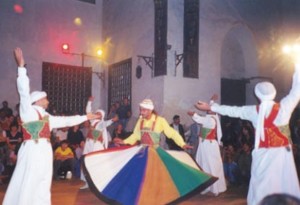
As he spins he seems to communicate with someone unseen, gesturing to the air above,
to his heart inside, and to the audience all around. He breaks routine occasionally to lift one of his skirts, swirling it over his head, colors mix together like a kaleidoscope. The drummers who have been circling around him swing their arms upwards or out, sometimes stopping altogether to strike a pose which showcases the talent of the central dervish who has not yet skipped a beat in rotations. |
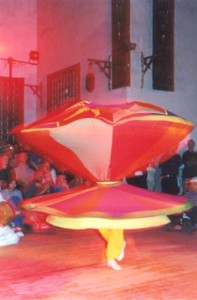
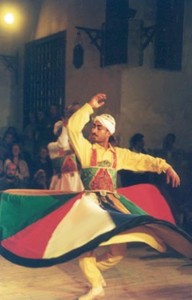
45 minutes later to a standing ovation they exit and a new group of musicians enter.
These men are robed in black, a stark contrast to their brothers previously. |
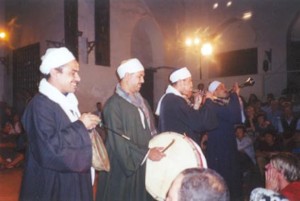
Our time has come to an end and I hate to have to leave. I have been transported
to another time and existed in my own world filled with spinning colors, passionate
music and the joyful embrace of the celebration of life. I have felt their
joy, have felt their energy and enthusiasm for what life holds dear for them.
They passed on so much to us and I am honored I was welcomed into their presence
for 90 minutes. |
Proudness is soon replaced by humbleness as the audience loudly shows their approval
to each and every one. |
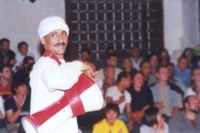
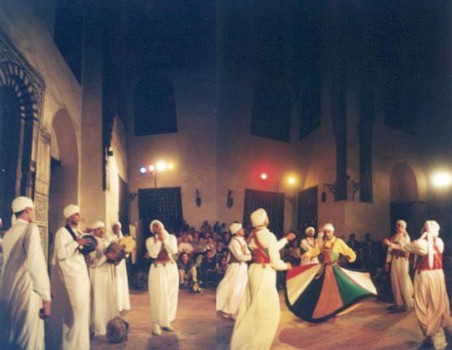
copyright: Kristin Reimer 2000 |
Lattice shadows upon a stone wall dim into darkness as the Islamic style lamp closes
down. Blue light begins to glow to the old mosque and the rustle of robes break
an expectant silence when turbaned men almost seem to glide into the room
along the wall....... |
The sound of a lone flute draws a long haunting note that is soon joined by strings
followed by a steady pulse of a drum. It almost feels like an Egypt of ancient
times and if I focus out the multitude of tourists I can almost image I have
sneaked into an ancient ritual. |
Soon I will witness a dance of trance, connecting not just with Allah, but with the
hearts and souls of the Egyptian musicians and most of all, what we have all
come to see.............. |
The Whirling Dervishes. |
The tune is again playful and spirited. You can pick out the locals in the audience
- they are the ones with their arms swaying before them, their hands clapping
in unison to the music, their smiles alit as their eyes twinkle with delight
and happiness. |
The musicians make their way around to greet the audience, their feet completely
in synch with each other as they do a shuffling step in a circle facing the audience,
their eyes make contact with everyone, winking and grinning as they continue
their song - they are as enraptured as the audience. |
Excerpt from "Egypt: The Rough Guide" written/researched by Dan Richardson, Publisher:
Penguin Group 1996 "The Mowlawiyya are Egyptian adherents of a Sufi sect founded in Konya, Turkey, during the mid-thirteenth century, and known to Westerners as the Whirling Dervishes. Their Turkish name, Mevlevi, refers to their original Master, who extolled music and dancing as a way of shedding earthly ties and abandoning oneself to Gods love. The Sufi ideal of attaining union with God has often been regarded by orthodox Muslims as blasphemous, and only during Mamluke and Ottoman times did the Whirling Dervishes flourish without persecution. In modern Egypt the sect is minuscule compared to other Sufi orders, and rarely appears at moulids, but a tourist version of the famous whirling ceremony is staged at the Ghuriya cultural centre in Al-Ghuri's Mausoleum. If the Mowlawiyya are in Cairo, performances are held on Wednesdays and Saturdays at around 8-9pm; phone during the day and ask if one is scheduled. Each element of the whirling ceremony (samaa) has symbolic significance. The music symbolizes that of the spheres, and the turning of the dervishes that of the heavenly bodies. The gesture of extending the right arm towards heaven and the left towards the floor denotes that grace is being received from God and distributed to humanity without anything being retained by the dervishes. Their camelhair hats represent tombstones; their black cloaks the tomb itself; their white skirts shrouds. During the samaa the cloaks are discarded." |
copyright: Kristin Reimer 2000 |
copyright: Kristin Reimer 2000 |
copyright: Kristin Reimer 2000 |
copyright: Kristin Reimer 2000 |
copyright: Kristin Reimer 2000 |
copyright: Kristin Reimer 2000 |